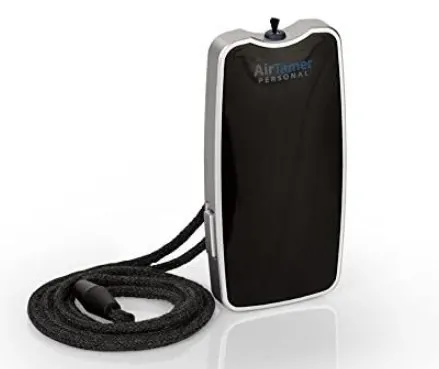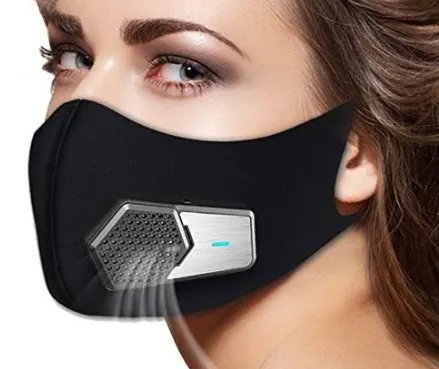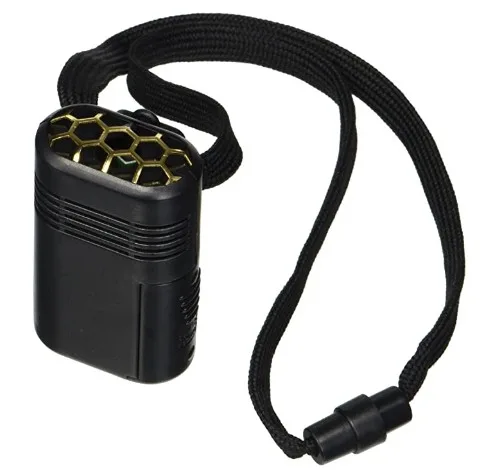There has always been a need to improve air quality during the cold and flu season; however, this need has dramatically increased with the pandemic here. You’re going to come into contact with air pollutants throughout the day. Therefore, more people seek more ways to reduce the amount of these germs and contaminants floating in the air around them, hence the rise in popularity of personal air purifiers.
Manufacturers make personal air purifiers to wear around your neck to remove airborne pollutants – including viruses, bacteria, pollen, foul odor, smoke and dust – from the user’s personal space. How effective an air purifier depends on its filtration method, maximum area coverage and battery life. This article will inform you about everything you need to know about personal air purifiers.
How do personal air purifiers work?
Personal air purifiers are portable air purifiers worn around the neck to clean the air around you when you’re on the go by binding with dust particles, bacteria, mold, allergens, smoke, and dust mites. By cleaning the air, air purifiers reduce the threat posed by air pollutants.
Most air purifiers have shown significant results in increasing air quality around you if you’re in a confined space and the wearer is not moving too much. Also, how well a personal air purifier works depends on its specifications, the size of the area you’re targeting, and the air quality around you.
How do personal air purifiers work?
There are two main types of personal air purifiers differentiated by how they clean the air, that is, ion emitters, mechanical filtration, and electronic precipitation,
1. Ionizers
The personal ionic air purifiers clean the air by emitting negative ions that bind with the pollutants. The binding makes the pollutants negatively charged, and the ionizers act like a shield that repels the contaminants away from your breathing zone. If you get a personal air purifier that uses ionizers, ensure it does not produce ozone because it could irritate the lungs and aggravate asthma and other respiratory conditions.
2. HEPA filters
The air purifiers that clean the air using mechanical filtration contain a fan and filter. The fan physically draws air from the outside into the unit, passes it through a filter or series of filters, trapping the allergens and pathogens from the air and releases the filtered air.
Other air purifiers can incorporate both methods and add UV light to kill viruses, bacteria, mold, or spores around you by exposing them to ultraviolet light.
What are the advantages and disadvantages of using a personal air purifier?
Below we have explained the benefits and demerits of using air purifiers.
Advantages of air purifiers
- Air purifiers improve the quality of breathing by removing unpleasant odors usually caused by pollutants in the air.
- They also reduce allergy symptoms by getting rid of allergenic microorganisms from the air, allowing you to breathe in the air free from allergens, especial if you’re sensitive to dust, pets, dust and pollen.
- Air filters with ionizers and a HEPA filter are great at reducing germs and bacteria around you, allowing you to breathe cleaner air.
- Air purifiers with activated carbon filters can get rid of most cancer-causing compounds, therefore, reducing your chances of developing cancer in the long run.
- They also prevent you from inhaling tobacco and cigarette smoke and reduces the risk of developing respiratory issues from passive smoking.
Disadvantages of air purifiers
Some ionizers emit ozone, which can increase asthma symptoms, coughing, shortness of breath, chest tightness, and other respiratory conditions. Exposure to ozone is harmful to cells in the respiratory tract.
- They require frequent cleaning and maintenance to remove all the contaminants accumulating in the filter. Most air purifiers have disposable filters that require replacing regularly, which can be quite costly over time; otherwise, the unit stops working correctly. You will also need to replace the whole unit yearly to ensure it works all the time efficiently.
- Air purifiers can worsen allergies because they pull the pollutants towards you and create a highly concentrated space with airborne allergens.
- Air purifiers are not 100% efficient. Some units may remove smoke and odor bad cannot filter disease-causing microorganisms. Others can filer out allergens but are ineffective against chemicals, odors and smoke.
- Since wearable air purifiers are pretty small and compact and you use them when you’re on the go, it makes it difficult to know if the device is working.
Do personal air purifiers work against Covid-19?
Personal or portable air purifiers alone can’t prevent the transmission of Covid-19; you have to incorporate other preventive measures such as wearing a face mask, regular hand hygiene, and maintaining social distance.
Though air purifiers can capture most airborne particles, including bacteria, viruses, and mold, air purifiers are not 100% effective against the Covid-19 virus. Most pathogens are at least 0.3 microns in size, the Covid-19 virus is about 0.125 microns in size, so it is smaller than most wearable HEPA filter air purifiers would capture. However, if the virus is inside a respiratory droplet, an air purifier with a HEPA(High-efficiency particulate arresting) filter will trap it and remove the virus.
Why are air purifiers bad for you?
Air purifiers that use HEPA filters, UV light, or ionizers are harmless to the human body. However, ozone generators are ineffective and can cause or elevate coughing, throat irritation, shortness of breath, and other respiratory issues even in healthy people. Air purifiers with ozone generators are harmful to you because they alter the standard oxygen molecule from having two atoms to three atoms. This altered oxygen molecule is called ozone and interacts differently with the environment than the normal oxygen we usually breathe. Also, ozone can react with other chemicals in the air to form more toxic pollutants, which have a dangerous effect when inhaled.
Although so much research has proven that ozone generators are hazardous, they are still in the market due to misleading advertising by manufacturers, and no government agency can regulate these devices. Therefore it is essential to know what type of air purifier you’re buying to avoid health issues.
Check this too: Best air purifier for cigarette smoke removal
What are the best personal air purifiers?
With the large variety of air purifiers in the market, it can be challenging to decide which one is the best. The buying guide below shows out best wearable personal air purifiers that will effectively clean the air around you.
1. AirTamer A310 Personal Rechargeable and Portable Air Purifier
The Airtamer A310 air purifier is the leading personal air purifier brand in the market, claiming to remove up to 875% of impurities from the air. The AirTamer uses an ionization method that pushes away air pollutants from your breathing zone and emits a 3-foot orbit of clean air in all directions.
Features
- Weight 0.11 pounds
- Batteries: 1 Lithium Polymer batteries
- 150 hours of operating time per charge.
- 2 million ions per second
- 28 sq. ft. coverage area
- Necklace ion generator with adjustable strap
Pros
- It has no filters to replace and clean.
- Easy and convenient to wear.
- It has no noisy fan or motors.
- It is suitable for all age groups.
Cons
- The device has no way to measure effectiveness.
2. Rsenr User Personal wearable air purifier
This personal air purifier is an excellent option during the pandemic as it also doubles as a face mask. You have to press the start button for five seconds longer to turn on the air purifier. It is an electronic air purifier mask that has a built-in turbofan with three adjustable speed settings. It also contains a filter with a purification rate of 98% that absorbs airborne pollutants.
Features
- Weight: 1.06 ounces
- Batteries: 1 Lithium Polymer batteries
- Wearable around the mouth.
- Medical-grade HEPA filters 97.8% of microscopic pollutants that are as small as 0.3 microns
Pros
- Lightweight respirator.
- Eliminates dust, allergens, germs, pet dander, and smoke
- It has adjustable airflow.
Cons
- The filter requires replacing often.
- It may cause foggy vision if you wear it with glasses.
- The fan produces a whistling noise.
3. Wein Minimate AS150MM
This air purifier is ultra-light and produces ions using its solid platinum plasma emitter. The ions attack bacteria, pollen, viruses, and mold to keep your clean and fresh air around. In addition, the gold-plated stainless steel collectors trap the contaminants, which reduces the number of pollutants around you.
Features
- Weight: 1.5 ounces
- Batteries: 1 CR123A batteries
- 120 trillion ions/second
- 8 hours of operating time per charge.
- 50 sq. ft. Coverage area
- It has a breakaway strap
Pros
- Maintenance-free
- It has a high ion output making it highly efficient.
- It is very lightweight.
Cons
- It is pricey.
Conclusion
Air purifiers are great for protecting your health and maintaining good air quality by eliminating airborne pollutants such as dust, allergens, viruses, bacteria, mold, spores, germs, pet dander, and smoke. However, the effectiveness of your air purifier high depends on the product quality. Although some personal air purifier models have a filter, most brands use ionizing technology to clean the air around you.
Check this too: Molekule air Purifier How to & Troubleshooting Guide




